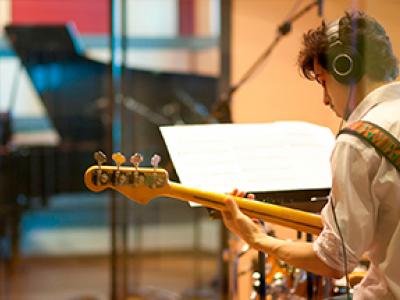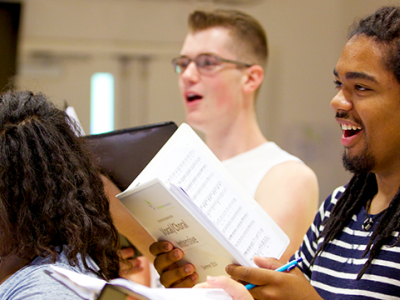What does a Backup Singer do?
Although many never step into the spotlight as recording artists, backup singers are among the most nimble, consistent, and skilled vocalists out there. Whether they're working in the studio as session musicians, supporting an artist on tour as touring musicians, or providing vocals for an advertisement, video game soundtrack, television broadcast, or film score, backup singers bring professionalism and versatility to the job. Most are freelancers hired by an artist, producer, recording engineer, or music director, and may choose to take on both studio and live work or focus their career on one area.
In the studio, backup singers—usually known as session singers—are trusted for their ability to walk into a recording studio, look over a piece of sheet music, and nail a part on the first take with little or no rehearsal. They're also known for their flexibility, providing vocals to artists and tracks across many different genres and shifting vocal style on request. In the course of a week, a session singer might work on a hip-hop track, sing on a jazz record, and do harmonies for a pop-country hit.
Live performing backup singers assist artists on tour, at special concerts and festivals, and during television broadcasts, bringing layered studio harmonies to life. If they're working with a pop star, live backup singers may learn and perform choreography as part of the job. In each setting, backup singers are expected to perfectly complement but never overshadow the lead singer—sometimes providing contrasting textures to the lead vocal, and sometimes precisely matching the singer's tone, personality, rhythm, phrasing, and accent. The bottom line? Backup singers are vocal chameleons.
At a Glance
Session singers are usually conservatory or university trained, as the job requires excellent sight-reading and harmonizing skills and a keen understanding of vocal technique. A session singer might start out providing vocals for demo tracks by songwriter-producers before being hired to do session vocals for a full studio recording. On the other hand, live backup singers often start out as singers in original bands and other live performance projects before being scouted as backup singers for large pop acts.
Building a reputation as a skilled and reliable vocalist leads to more referrals and gigs with more prestigious artists. Skilled session singers with improvisation and songwriting abilities can go on to become top-line songwriters, while those interested in sharing their hard-won technical knowledge and experience could become vocal coaches. Some backup singers also go on to find success as solo or recording artists.
As with many freelance jobs in the music industry, starting out as a backup singer involves networking and cultivating relationships with people who can provide that first big break: other singers, producers, arrangers, music directors, and music contractors. Session singers should record a demo reel to showcase their vocal talent and stylistic flexibility, and be ready to sing anytime.
- Top-notch vocal technique
- Sight-reading
- Vocal harmony
- Vocal improvisation
- Knowledge of and proficiency in broad musical styles
- Excellent ear for pitch, tone
- Versatility
- Punctuality
- Reliability
- Collaboration
- Networking
Session singers might work with new artists and producers in wildly different genres every day, so the ability to quickly acclimate to new musical styles and get along with various personalities is a real asset. Professionalism is another crucial skill—particularly punctuality, reliability, and focus, which help the backup singer get the job done without wasting valuable studio or rehearsal time. Responding quickly and effectively to direction from the producer or vocal arranger is also critical.
As freelancers, backup singers choose which gigs to pick up, and usually work at local studios. While most sessions, performances, and tours are scheduled well in advance, it's not unusual for a call to come in at 11:00 p.m. for a session the following morning. Backup singers who accompany artists on tour could be away from home for some time, depending on the length of the tour.







